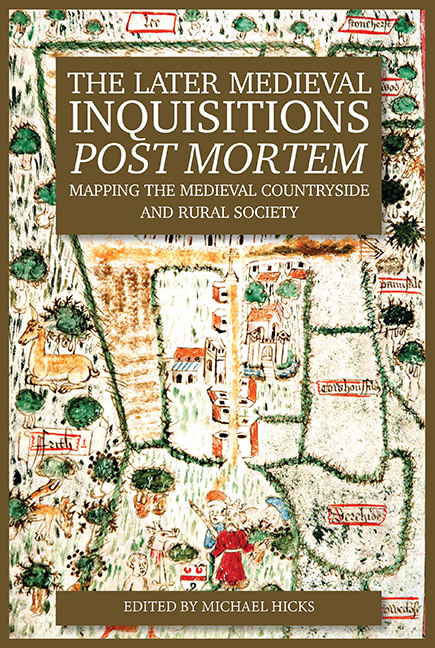Book contents
- Frontmatter
- Contents
- List of Illustrations
- List of Contributors
- Glossary
- List of Abbreviations
- 1 Introduction
- 2 Records of an Imperial Administration? Inquisitions Post Mortem in Scotland and Calais
- 3 Inquisitions Post Mortem in Medieval Ireland
- 4 The Court of the Honour of Clare, 1308–60: Feudal Incidents and Inquisitions
- 5 Landscape, Farming and Society in an English Region: The Inquisitions Post Mortem for the West Midlands, 1250–1509
- 6 Beyond the Dots: Mapping Meaning in the Later Medieval Landscape
- 7 Fairs and Markets in the Inquisitions Post Mortem
- 8 The Structure of the Milling Industry 1427–37
- 9 Proofs of Age 1246 to 1430: Their Nature, Veracity and Use as Sources
- 10 What Went On in the Medieval Parish Church, 1377–1447, with Particular Reference to Churching
- 11 Retainers, Monks and Wine: Three Insights into Everyday Life
- 12 The Administration and Efficiency of the Inquisitions Post Mortem Process: A Case Study of Northumberland
- 13 Late Medieval Land Disputes and the Manipulation of the Inquisitions Post Mortem
- Index
7 - Fairs and Markets in the Inquisitions Post Mortem
Published online by Cambridge University Press: 26 May 2021
- Frontmatter
- Contents
- List of Illustrations
- List of Contributors
- Glossary
- List of Abbreviations
- 1 Introduction
- 2 Records of an Imperial Administration? Inquisitions Post Mortem in Scotland and Calais
- 3 Inquisitions Post Mortem in Medieval Ireland
- 4 The Court of the Honour of Clare, 1308–60: Feudal Incidents and Inquisitions
- 5 Landscape, Farming and Society in an English Region: The Inquisitions Post Mortem for the West Midlands, 1250–1509
- 6 Beyond the Dots: Mapping Meaning in the Later Medieval Landscape
- 7 Fairs and Markets in the Inquisitions Post Mortem
- 8 The Structure of the Milling Industry 1427–37
- 9 Proofs of Age 1246 to 1430: Their Nature, Veracity and Use as Sources
- 10 What Went On in the Medieval Parish Church, 1377–1447, with Particular Reference to Churching
- 11 Retainers, Monks and Wine: Three Insights into Everyday Life
- 12 The Administration and Efficiency of the Inquisitions Post Mortem Process: A Case Study of Northumberland
- 13 Late Medieval Land Disputes and the Manipulation of the Inquisitions Post Mortem
- Index
Summary
‘Too unreliable to be of any value’, or ‘the single most useful source’ for analysing many aspects of medieval agrarian history? The reliability of the extents and valuations in the inquisitions post mortem has indeed been hotly debated. And while many historians have been dismissive, the need for a more nuanced assessment is increasingly recognized. Bruce Campbell's pioneering researches for the period 1300–48, in particular, showed that large-scale analysis of the extents over a broad chronological and geographical framework, using geospatial and other visualizations, can be very revealing. The precision and reliability of the IPMs may vary from one period to another: Campbell found that the years of exchequer reform between approximately 1322 and 1340 were characterized by particularly detailed extents. The IPMs may also vary from area to area: local administrative, geographical or social conditions may mean that some escheators recorded some items in more detail than was true elsewhere. Some types of information may also, typically, be more reliable than others: valuations, in particular, are apt to underestimate.
A sound, accurate assessment of the late medieval extents and valuations requires not only comparison with other sources, such as accounts, but for Campbell's methods to be extended to other periods. The digitization and georeferencing of the IPMs from 1399–1447 now enables comparable approaches to be applied to documents from the first half of the fifteenth century. This paper offers a small contribution to this project by exploring records of fairs and markets in the inquisitions. It focuses on the period 1399–1447, for which the calendared texts contain full details of valuations and extents. All references to markets and fairs in this period were identified from keyword searches of the digitized text and checked against the published subject indexes.
Markets and fairs present an approachable topic because so much on the subject has been collected in an authoritative and comprehensive secondary source, the Gazetteer of Markets and Fairs in England and Wales to 1516 compiled by Samantha Letters and others and maintained by the Centre for Metropolitan History. Furthermore, although IPM extents were not included in the early volumes of Calendars, the existence of markets and fairs was noted and indexed from CIPM iii (1912) onwards, allowing us to explore data from c.1291 onwards.
- Type
- Chapter
- Information
- The Later Medieval Inquisitions Post MortemMapping the Medieval Countryside and Rural Society, pp. 100 - 114Publisher: Boydell & BrewerPrint publication year: 2016



